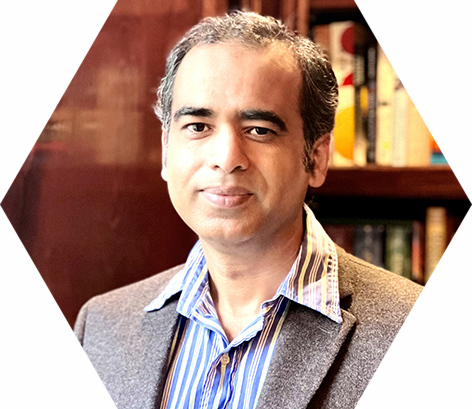Education
- Post-Doctoral Fellow, Mechanical Engineering, Georgia Institute of Technology, 2010-13
- Ph.D. Biomedical Engineering, The University of Texas at Austin, 2006-10
- M.Tech. Biomedical Engineering, Indian Institute of Technology-Bombay, 2004-06
- B.E. B. T. Kumaon Institute of Technology., India -2000-2004
Background
Prof. Singh will join the Woodruff School on July 1, 2020 and will have a joint appointment with the Wallace H. Coulter Department of Biomedical Engineering at Georgia Tech and Emory University.
Prof. Singh started at Cornell University as an Assistant Professor in 2013 and was promoted with tenure to Associate Professor with joint appointments in the Mechanical Engineering and Biomedical Engineering. At Cornell, he served as the Associate Director of the NIH T32 training grant on Immuno-engineering, executive council of the Center for Immunology, and the Cornell (Ithaca) – Weill Cornell Medicine (NYC) Academic Integration initiative. Prior to joining Cornell, he completed his postdoctoral training in cell mechanobiology, cell-matrix interactions, and stem cell engineering at Georgia Tech in Mechanical Engineering.
Research
- Bioengineering; Engineered materials and technologies for studying and modulating immunity, infectious diseases, cancer, and inflammation. We have four major directions: Immuno-engineering; Cancer Bioengineering; Immunomodulation in Metabolic Syndrome; Micro-Nano-Bioengineering
My research aims to develop “living” immune tissues as organoids or on-chip to recapitulate dynamic immunological events in lymph nodes and spleen and enable discovery and/or translation of immunotherapies. Our engineered materials in organoids communicate and manipulate the decision-making process of immune cells at the cellular, molecular, and epigenetic levels. Our application areas are cancer, infections, and inflammation. Within the cancer engineering, we have developed ex vivo “malignant” immune tissues by integrating micro-nano-bioengineering, patient-derived lymphoma cells, biomaterials, tissue mechanics, transport and lymphatic-like fluid flow. We are interested in discovering how biophysical forces and tissue microenvironment influence immune cell receptor signaling and epigenetics of lymphomas, as well as therapeutic responses. Finally, an emerging area in the laboratory is materials-based immunomodulation in metabolic syndrome patients that manifest poor immunity due to alterations in the gut microbiome. Research in Singh laboratory is supported by the National Institute of Health (NIAID, NCI, NIBIB), Department of Defense, National Science Foundation, 3M, and Leukemia and Lymphoma Society. Learn more here.
- 2019 3M Non-Tenured Faculty Award
- 2018 Cornell Research Excellence Award
- 2018 3M Non-Tenured Faculty Award
- 2017 Cornell Teaching Excellence Award
- 2017 Young Investigator Award – Society for Biomaterials
- 2017 Department of Defense CDMRP Career Development Award
- 2016 National Science Foundation CAREER Award (DMR: BMAT)
- 2016 Biomaterials Outstanding Paper Award by Elsevier
- 2016 Highlighted in Discover Magazine – 100 Top Stories of 2015
- 2014 Young Innovator Award – Cellular and Molecular Bioengineering
- 2014 Rising Star Award, Biomedical Engineering Society Cellular & Molecular Engineering (CMBE)
Select Publications
- MJ. Mosquera, S. Kim, H. Zhou, TT. Jing, M Luna, JD Guss, K. Lai, I. Brito, CJ. Hernandez, A. Singh*. Immunomodulatory nanogels overcome restricted immunity in a murine model of gut microbiome-mediated metabolic syndrome. Science Advances. 2019;5(3):eaav9788.
- S Kim, SB. Shah, P. Graney, A. Singh*. Multiscale engineering of immune cells and lymphoid organs. Nature Reviews Materials. 2019, 4: 355–378.
- W. Beguelin, M. A. Rivas, M. T. Calvo Fernandez, M. Teater, A. Purwada, D. Redmond, H. Shen, M. F. Challman, O. Elemento, A. Singh* and A. M. Melnick* (2017). EZH2 enables germinal center formation through epigenetic silencing of CDKN1A and an Rb-E2F1 positive feedback loop. Nature Communications 2017. 8. 877.
- F Apoorva, A Loiben, S Shah, A Purwada, L Fontan, B Kirby, A Melnick, B Cosgrove, A Singh*. How Biophysical Forces Regulate Human B Cell Lymphomas. Cell Reports. 2018, 23, 499-511.
- A Purwada, A Singh*. Immuno-engineered Organoids for Regulating the Kinetics of B cell Development and Antibody Production. Nature Protocols, 2017, 12, 168-182.
- T T Lee, J Garcia, J Paez, A Singh, E A Phelps, Z Shafiq, A Shekharan, A del Campo, A J Garcia. Lighttriggered in vivo Activation of Adhesive Peptides Regulates Cell Adhesion, Inflammation and Vascularization of Biomaterials. Nature Materials, 2015, 14, 352-60, 2015
- A Singh, S Suri, T Lee, J M Chilton, W Chen, J Fu, S L Stice, H Lu, T C McDevitt, A J Garcia. Adhesive signature-based, label free isolation of human pluripotent stem cells. Nature Methods 2013, 10:438-444.

